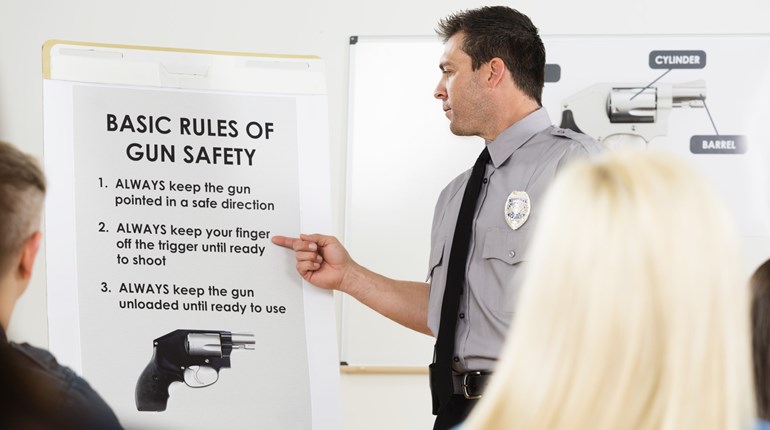
If you're like the vast majority of young women, chances are your first year of college also represents the first time you've lived on your own for any length of time. It's an exhilarating time, when everything is alive with possibility. Unfortunately, one of those possibilities is becoming the focus of a criminal's attention. Predators know that very young women lack the life experience to fully evaluate risk, which means that they tend to be too trusting. Campus life adds a few other wrinkles to one's self-defense strategy, as well. New students frequently don't have the option to choose where they'll live or with whom; parking is usually assigned and underclassmen tend to get the least desirable spots; the possession of self-defense tools is frequently prohibited on campus. This article won't address the wisdom or rightness (or lack thereof) of any of those "wrinkles." Rather, we'll focus on what you, specifically, can do to help shore up your own safety right now given the situation that exists.
1. Lock your car doors.
Did you just roll your eyes reading that? We can't blame you if you did, but the fact is that many of the folks who prey on college students aren't terribly sophisticated. In fact, many of them are college students themselves. The most commonly reported crimes on campus are burglary and car theft...and for many thieves, their targets are targets of opportunity. The unlocked car parked far away from the dorms is fruit hanging so low it might as well be a potato. Can a determined crook break into a locked vehicle? Sure they can—but why make it easy, quiet and safe for them by leaving your car unlocked? You can also cut your risk by remembering to stow or take with you any items that are portable and valuable, such as electronics or textbooks.
2. Lock your dorm entry points and insist your friends do the same.
At my alma mater, we had what was (at the time, anyway) state-of-the-art security doors for entry to the dorms as well as for each individual floor. Not that it mattered; the students pretty much never let them close. They—we—would chock them open at every opportunity so that we wouldn't have to remember our student ID keycards, and so our friends could come and go freely. Most students didn't bother locking their room doors, either. And then we'd all be shocked and angry when somebody's computer or TV walked off. The problem is one of perception: Many young people judge the intentions of others based on their own intentions. You wouldn't wander into an empty room and walk out with someone's possessions, so it's hard to imagine someone among your friends and neighbors would do such a thing...but they might. So could an outsider who doesn't attend your college but just knows his or her way around. What's more, theft is not the only possible consequence of subverting the security your campus has in place...the third most commonly reported crime on campus is sexual assault.
3. Got an image of a "criminal" in your head? Lose it.
In The Addams Family movie, young Wednesday Addams is asked why she isn't dressed up for Halloween. "I'm a homicidal maniac," she deadpans. "They look just like everyone else." The line is played for laughs, but that doesn't make it any less true. Not only aren't criminals generally considerate enough to wear a badge identifying them as such, it's also a sad fact that you are most likely to be victimized by someone you know. That doesn't mean that you can't develop a knack for spotting people who might be a problem; you absolutely can. But what you have to look for are suspicious behaviors and attitudes. Pay particular attention to people who discount or ignore your boundaries, people who try to guilt or shame you into doing things you don't want to do, and particularly people who try to put you into positions of vulnerability.
4. Party smarter, not harder.
Speaking of "positions of vulnerability," the time when you are arguably at your most vulnerable is when you are under the influence. Although the absolute best advice is to never be under the influence, better people than I have failed at convincing young adults to follow it. So if you must party, do it smarter, not harder. One way to do this is to take refuge in the safety offered by numbers. Go out in groups, and go out with a plan. Determine ahead of time where you'll go, when you'll plan on leaving and where you'll meet up. Arrange for safe transportation ahead of time, so nobody is stuck looking for a ride at the end of the night. Designate one woman in the group to be what we used to call the "mama hen." Her job is to remain sober, to ensure that nobody gets left behind, and to be the voice of reason when anyone in the group gets any of those oh-so-terrific ideas that occasionally bubble up when folks are downing drink. Speaking of drinks, don't leave yours unattended...even if it's just for a minute. It takes seconds to furtively slip something into a person's unattended beverage...and when everyone's imbibing, it's even easier to do so unnoticed.
5. Recognize that there are worse things than being "rude."
For better or for worse, young women are socialized to be polite. The "worse" part of that "better or for worse" equation is that many of us find it difficult to clearly enforce our boundaries for fear of being seen as rude. It's even harder to do that when you're doing your best to fit in with a whole new social circle; nobody, regardless of their age or gender, wants to gain a reputation for being boring, unpleasant or a stick-in-the-mud. That said, the worst thing you can do by being "rude" to someone who is making you uncomfortable is that you accidentally hurt the feelings of an innocent person. The good news is that innocent people who genuinely have your safety and comfort at heart will not only back off immediately, they'll accept your apology later if you turn out to have been wrong.
As for what to do about the people who will take your wet clothing out of the dorm's dryers and dump it on the floor the second you turn your back (and they will, just you wait and see)? Can't help you there—but if you have any suggestions, the comment section is right below...















































